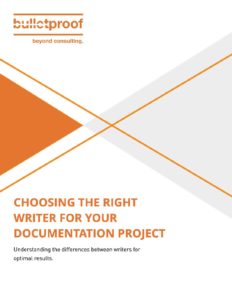Pharmaceutical technical writers are a broad collection of technical people including engineers, biologics, chemists, microbiologists, and even a few liberal arts majors. Nearly all writers share a passion for accuracy, completeness, robustness, compliance, and clarity.
But what pharmaceutical companies need from their writers differs across projects, products, departments, and maturity. Some companies need document processors to manage redlines and facilitate approvals. Other companies need an expert to identify and address compliance or procedural gaps. Some companies need writers to compile, analyze, and summarize data for reports. And others need authors who can leverage data to tell a story, inform and instruct readers, or present a scientific perspective for a submission.
Matching writer skills to project objectives is an important first step. Why?
- Hiring a document processor for a GMP facility commissioning project could result in poorly written, inaccurate, or incomplete documentation that requires significant rework to achieve GMP production success.
- Engaging a quality consultant to develop CMC modules for a license application may result in improperly interpreted or presented data that could lengthen submission time and result in missed milestones.
- Hiring a CMC regulatory writer for a large SOP reformatting project may result in excessive word-processing time and higher costs.
What are the required skills needed for your documentation project? How do documentation professionals differ? How can you secure the right writer?
Read this ebook by Bulletproof Docs to understand the differences between writers for optimal results.


